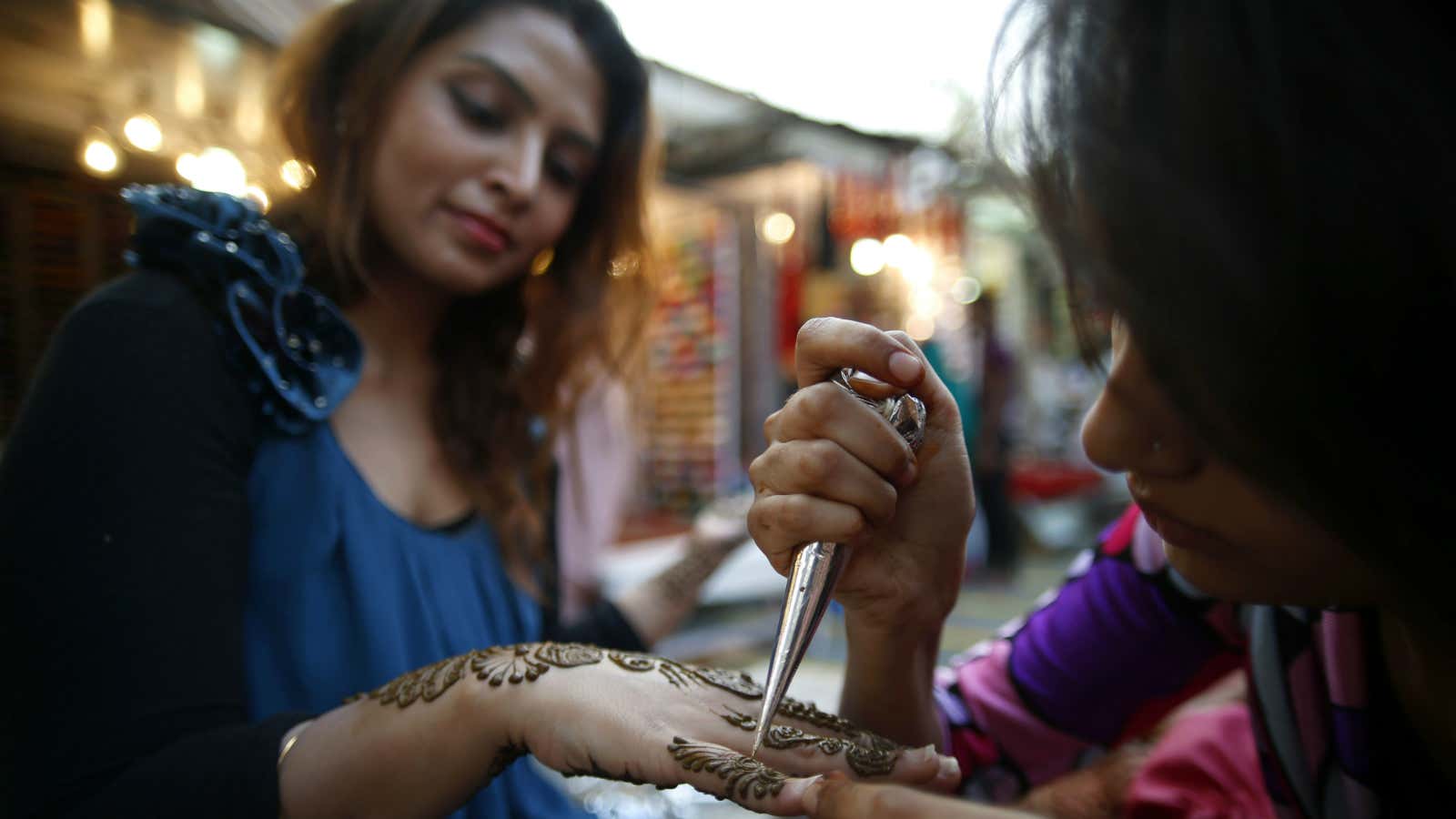6 p.m.: Am I curled up on my couch reading Harry Potter and the Goblet of Fire? Am I getting ready for an infamous Bollywood party or am I sitting in a salwar kameez getting henna applied on my palms in preparation for tomorrow’s torturous fast? No prizes for guessing this one. I am one of the many fortunate women who get to stay hungry and thirsty all day in order to magically lengthen my other half’s life.
In ancient times, I can appreciate why one would enthusiastically undertake such a task—if you know that as soon as your other half pops it, someone is going to make you jump into a large, blazing fire and commit sati. I can completely understand the motivation to try any means to prolong your husband’s lifespan, but today, when the unfortunate circumstance of your spouse’s demise merely frees you up to place ads in the matrimonial column, go on online dating sites and feverishly attend bar nights, the zeal for such taxing endeavours seems a bit extreme . . .
5 a.m.: If there is a God, He hates me. I can’t think of any other reason why I am stumbling around the house at this unearthly hour normally reserved for owls, bats and the man of the house.
5.30 a.m.: My mother-in-law has sent me a big basket of fruits and sweets which I must eat before sunrise so that I can starve the entire day, thereby triggering a mystical spell (known only to Indians and NRI fans of Karan Johar movies) that will enable her beloved son to live a long life. I have tried to protest that the newspaper states sunrise is at 6.31 a.m., so I could technically wake up at 6.15 a.m. and gulp some food before the crucial moment the above-mentioned spell loses power, but to no avail.
When I further point out that the pet tortoise in our garden is definitely going to outlive all of us and I don’t see anyone fasting for him, I get a withering look from her and a sharp nudge in the ribs from the man of the house.
10 a.m.: I gulp my saliva since that is the only liquid I am allowed to consume, and call a fellow member of the Karva Chauth Torture Club who goes on to tell me how lucky I am because she has to follow stricter rules than me. She is not allowed to wash her hair on Karva Chauth. She chuckles that even if a crow shits on her head today, she will still have to walk around with it because all her mother-in-law will tell her is that it is inauspicious to wet her hair today, but will not find it inauspicious to have a daughter-in-law who smells of crap.
11 a.m.: I need water . . .
1 p.m.: I need coffee . . .
3 p.m.: I need water, coffee and a large Scotch on the rocks . . .
4 p.m.: I know that all our Indian customs are based on scientific research by ancient minds where they spent decades examining and experimenting before they came up with specific rituals to ensure our well-being; so I do my own scientific research (which takes me a little less than five minutes, via Google) and the results are unmistakable. The United Nations research states that men with the longest life expectancy are from Japan, followed by Switzerland. I am rather surprised at this result as since time immemorial we have been doing the Karva Chauth fast to make sure our men have long lives, and the results should have definitely shown by now.
I scan the list, confident that in this chart of life expectancy, the Indian man must definitely be in the top 5. Nope! There are 146 countries above us where the men have longer lifespans, and the biggest blow is that even with four wives who don’t fast for them, the Arab men outlive our good old Indian dudes.
6 p.m.: We Indians are a strange race; we send MOM to Mars, but listen to mom-in-law and look for the moon. One of the better qualities we possess is that most of us will follow traditions and rituals as long as they do not demean or harm us, or cause us to do the same to another, while making our elders happy. We simply do it rather than prove a point as to how liberated and independent we truly are. Perhaps, this is how we harmoniously hold our large families together as we celebrate different aspects of our lives.
9 p.m.: Dressed in our finery, we gather on a friend’s terrace to look for the moon. As banal as I find most rituals, I am still swept away by the moment. A dark night, five good friends, sparkling with our bindis, zardozi and red outfits. We are giggling and taking pictures. Suddenly, someone spots the hazy orange outline of the moon, and we are now dragging out our men, laughing as we borrow things from each other’s plates, a strainer, a coconut barfi, a flower, laughing as we borrow things from our past . . .
Excerpted with permissions from Penguin Books India from the book Mrs Funnybones authored by Twinkle Khanna. Available in all major bookstores. We welcome your comments at ideas.india@qz.com.
